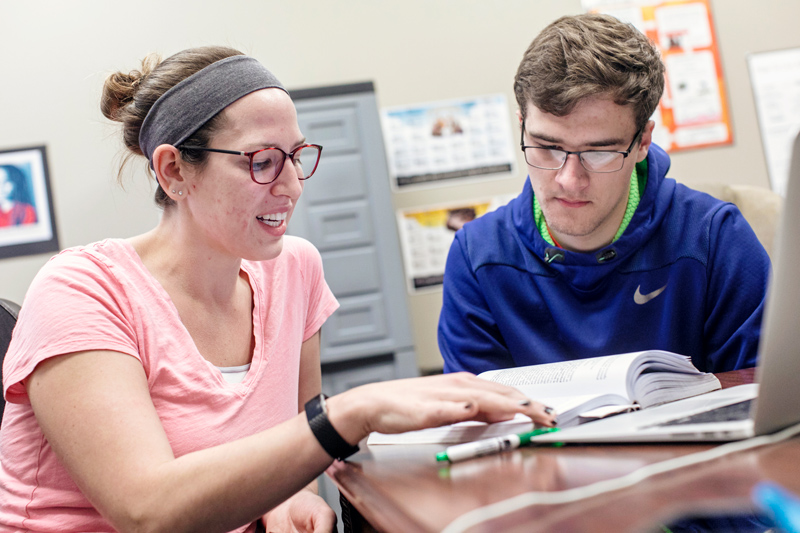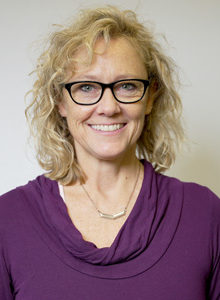According to the Centers for Disease Control and Prevention, one in 44 children in the United States is diagnosed with Autism Spectrum Disorders (ASD) by age 8 (Maenner, Shaw, Bakian, et. al.), but as these students progress through their academic career, it is known that they are less likely to go to college. While many of these students are as academically talented as their peers, their potential often goes unrealized. Many are fully capable of college level academics but require the appropriate environment and support structure. Again, the critical component for success for these students really depends on finding the college that best fits each student’s needs.

Graduate Assistant Maggie Miller assists student Mason White
So, the question is how do you find the right college for a student who falls on the autism spectrum? While the answer is as unique as the individual, there are ways to determine the best fit. It really just requires an intensive look into the individual strengths and needs of each student.
During my time as the Director of Student Accessibility and Support Services (SASS) at McDaniel College, I have found that there are really three key areas to assess for each student, which are actually not much different than what is required for all students planning to attend college. These include academic skills, independence skills, and self-advocacy skills.
I believe that students need to self-identify their strengths and challenges when it comes to academic skills. They need to be able to develop study skills that best support their individual learning preference and identify key points from lectures and readings. They also need to be able to express ideas both verbally and in writing.
Independence skills requires students to be able to work and study at least 15-20 hours independently each week. They need to be able to take care of themselves, which includes taking any required medications and self-care. Students also need to be able to independently get themselves to class and find ways to balance schoolwork and relaxation.
Lastly, these students need to be able to advocate for themselves. They need to be able to recognize and articulate if they need help and ask questions of their professors and peers. Students should also be able to identify the accommodations and services on campus that are available to provide assistance.
After taking the time to review these three areas, the next step is to locate a college with the appropriate resources and services in place that best meets the needs of the individual student. It is important to be truthful about what the most important areas are for a student when they are looking at various colleges. Resources that exist on many college campuses that make college a possibility include academic and mental health counseling, tutoring, and the ability to provide appropriate accommodations. Some schools may also have special residential options and life coaching available for students. Again, take the time to identify what the highest priorities and needs are for the student and make sure that the college has these resources in place.
Here are some questions to ask when considering potential resources:
- Is there a disability support office and does the office have adequate staffing to support student needs?
- What are the kinds of academic counseling and tutoring services available?
- Is there the opportunity to get more intensive support through the disability support office, such as an academic skills program? This level of service typically offers intensive weekly support from an academic counselor in areas such as executive functioning, academic skills and self-advocacy.
- Do students have access to social and communication focused programs, or targeted academic skill building programs?
- What type of evening study support may be available? At McDaniel, we offer PASS (Providing Academic Support for Success), which allows students a supported learning environment three evenings a week. Students have the ability to access assistance from a Graduate Assistant or use assistive technology available in the office while enjoying the structure of a quiet academic environment.
- Does the college provide any type of summer bridge opportunity to help orient and make a smooth transition for students into college level academics, campus resources, and the use of accommodations?
- What kind of assistive technology is available to support academic skill development, executive functioning, and communication skills?
- What wellness and mental health counseling resources exist and is there an opportunity for more intensive support if needed? Is there a direct line of communication between that office and the disability support office to provide holistic support for the student?
- What resources are available beyond the campus to fill in any gaps of accommodations that might be needed, but are not offered by the college, such as life coaching or academic evaluations?
In addition, it is also important to have reasonable expectations. The goal really should be to ensure access to learning for the student. It is not possible at the college level to modify assignments, course requirements, or graduation requirements. And, while some colleges may be able to offer one-to-one assistance or provide special courses for students with ASD, this is not the norm. Again, these are the type of accommodations that should be considered when a student is selecting the type of institution to attend.
My advice is to always visit the disability support office at the college that a student is looking to attend. Do a campus visit. Talk with current students about the accommodations that are provided. Also, have a conversation with the faculty in the department of the student’s intended major to discuss the requirements.
Keep in mind there is nothing wrong with looking into alternatives if after taking these steps, the college does not seem like a right fit. It might be as simple as seeking out different colleges, perhaps one that is specifically designed for students with disabilities, or it might be necessary to reconsider whether going away to college is what is best for the student. In this case, community college or a local university where a student can live at home might be an option. There are also college readiness programs and internships programs for students with disabilities, like Broad Futures, that might be worth looking into.
Just because a student has ASD, does not mean that college is out of reach. The bottom line is that an assessment is required for each individual student to determine what will make that student successful in college and beyond.
Melanie L. Conley, MS, is the Director for Student Accessibility and Support Services (SASS) at McDaniel College. She can be reached at 410-857-2504 or mconley@mcdaniel.edu. For information about Student Accessibility and Support Services (SASS) at McDaniel College, visit www.mcdaniel.edu/sass.
References
Maenner MJ, Shaw KA, Bakian AV, et al. Prevalence and Characteristics of Autism Spectrum Disorder Among Children Aged 8 Years — Autism and Developmental Disabilities Monitoring Network, 11 Sites, United States, 2018. MMWR Surveill Summ 2021;70(No. SS-11):1–16. DOI: http://dx.doi.org/10.15585/mmwr.ss7011a1external icon




